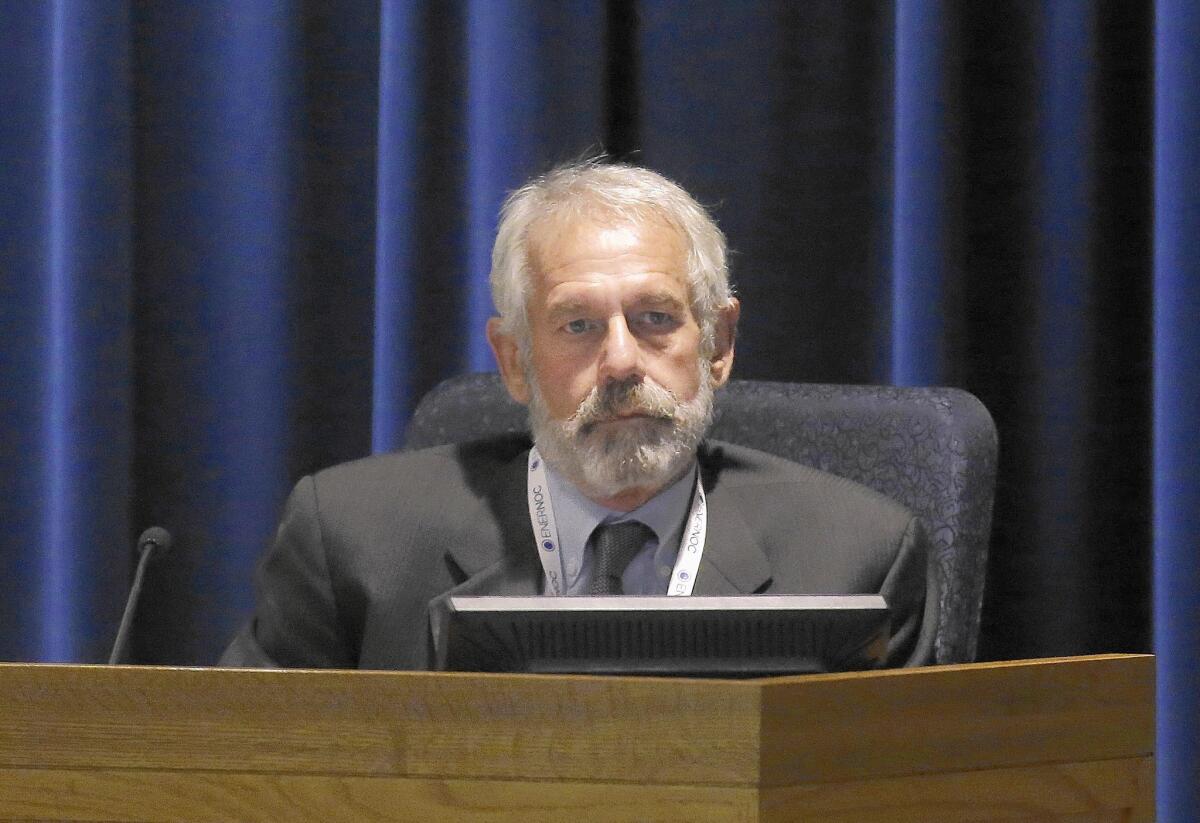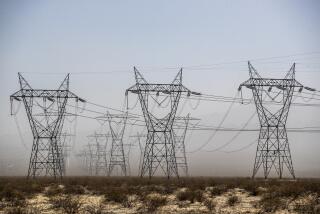Gov. Brown names Commissioner Michael Picker president of PUC

Moving to limit fallout from a growing scandal at the California Public Utilities Commission, Gov. Jerry Brown named his former renewable energy advisor, Michael Picker, as the new president of the powerful regulatory agency.
The governor also chose Liane Randolph, 49, general counsel at the California Natural Resources Agency, to fill Picker’s former seat on the five-member PUC, which has far-reaching powers over the rates and policies of the state’s private electric and natural gas power companies and other public utilities.
In recent months, the commission has been blasted by lawmakers, consumer groups and city officials for its cozy relations with industry, its safety record, its regulation of nuclear power — notably at the now-closed San Onofre nuclear power plant near San Clemente — and the complex, opaque and cumbersome way it operates.
Picker, 62, succeeds Michael Peevey, 76, a former Southern California Edison Co. president whose term expires Dec. 31. Peevey has drawn praise for his efforts to curb global warming. But under his leadership the normally low-profile agency has been tarnished by safety lapses and targeted by federal and state law enforcement investigations.
“Michael Picker’s deep experience and sound judgment make him uniquely qualified to take on this role,” Brown said in a statement. “Liane Randolph has handled very difficult issues with insight and balance and will be a real asset to the commission.”
In an interview with The Times, Picker called the PUC “an enormously challenging organization” where “people are starting to respond slowly to the need for change.” Randolph was unavailable for comment.
The PUC’s priority going forward would be safety, Picker declared. He said he would move quickly to create a full PUC field investigative team and to designate an internal safety advocate as well as external advisors, possibly from the University of California.
Picker recently took a lead role in getting commission approval of new programs to boost enforcement for violations of electric transmission and rail safety rules.
Deficiencies in the PUC’s safety programs became starkly evident in September 2010 when a Pacific Gas & Electric Co. natural gas transmission line exploded in the San Francisco suburb of San Bruno. The blast killed eight people, injured 66 and leveled 38 homes.
By nominating Picker, Brown signaled that he is committed to putting what he has called “fresh eyes” on the commission. The governor wants the PUC to stay on track in helping him meet a goal of getting a third of the state’s power from renewable energy sources by 2020.
Brown may also be seeking to distance his administration from criticism directed at the PUC under Peevey, who has become a lightning rod for public anger, particularly in Northern California, since the San Bruno disaster.
In recent months, a series of internal emails released by the utility giant Pacific Gas & Electric painted a warm and convivial relationship between Peevey and PG&E top officials, and prompted calls for reform.
At least two internal memos described meetings between the PUC president and a top lobbyist for the utility. Brian Cherry, PG&E vice president for regulatory affairs, met with Peevey in two separate get-togethers over drinks at Peevey’s Sea Ranch vacation home on the Sonoma County coast. Cherry and two other utility executives have since been fired.
According to a PG&E internal memo released by the company Monday, Peevey described the mayor of San Bruno as “emotional” and the city manager as “nuts” during a private meeting with Cherry on the last day of 2012.
PG&E made the missive public because, if accurate, it appeared to violate PUC rules against such private contacts between officials of regulated companies and commissioners and their top staff.
Such communications, by law, must be shared among all parties in a commission legal proceeding, such as a rate-setting case or an accident investigation.
The U.S. attorney’s office in San Francisco has filed a criminal indictment against PG&E in connection with the San Bruno explosion. At the same time, both the U.S. Department of Justice and the California attorney general’s office have been looking into the improper contacts between the utility and PUC commissioners and top executives.
In addition to the power companies, the San Francisco-based PUC oversees private water companies, ride-sharing and limousine services, some telecommunications providers, intrastate rail, and electric and natural gas power companies. It has about 1,000 employees. Picker’s pay at the commission will be $138,867 a year; Randolph’s will be $134,591.
The appointments of Picker and the lesser-known Randolph drew positive reactions from energy efficiency advocates, environmentalists, independent power generating companies and consumer groups.
“I believe that [Picker] cares deeply about right and wrong. It’s been a hallmark of his career,” said V. John White, executive director of the Center for Energy Efficiency and Renewable Technology in Sacramento. “He’s also a tenacious problem solver.”
Jan Smutny-Jones, who runs the Independent Energy Producers Assn., said he expects Picker to streamline the PUC’s prolonged and highly legalistic proceedings. He also said Randolph’s experience as chair of the Fair Political Practices Commission, the state’s watchdog agency, from 2003 to 2007 will help her colleagues deal with ethical issues raised by the flood of emails pouring out of PG&E about questionable contacts with regulators.
“It’s important that people have confidence that the regulators are doing their jobs,” Smutny-Jones said. “There are a lot of investigations going on in terms of the emails. There’s a lot of work the commission needs to do, and starting with a clean slate is a good thing.”
The state’s two biggest investor-owned power companies declined to weigh in on the PUC’s new leadership. PG&E did not respond to a request for comment.
Rosemead-based Southern California Edison said it “was pleased that the governor moved expeditiously to complete the roster of commissioners.” But Edison added that it “doesn’t believe it is appropriate for an entity regulated by the California Public Utilities Commission to comment on the appointments.”
Twitter: @MarcLifsher







